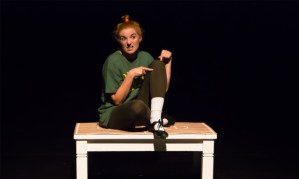Edinburgh review: Offside (Pleasance Courtyard)
Sabrina Mahfouz and Hollie McNish’s new play looks at the history of women’s football
Women’s football has had a long overdue moment or two in the limelight of late, not least when England got beaten by the Netherlands in the most recent semi-finals. It has been excellent witnessing the game get more air-time. But it’s taken too long to get to this point, as Sabrina Mahfouz and Hollie McNish’s new play Offside deftly demonstrates.
The piece takes up with two women competing for a permanent place on today’s England football team. They each have their sporting idols: Mickey’s is Emma Clarke who was the first black professional female footballer in 1892 in Stirling. Keeley’s is Lily Parr who played for a team in 1917 in Lancashire just before the FA decided to ban women from the pitch.
Mahfouz and McNish’s script is full of rolling, poetic lines that bounce and jump with a frenetic energy that helps to create something of the atmosphere of a footie match. Mickey and Keeley have their own stories, their own problems which come out through the narrative as they compete for their coveted position on the team and all the stuff that comes with it – scrutiny of your private life, the intense regime of training, training, training. But their position is counterbalanced by the remarkable stories of Emma and Lily, both of whom were playing and succeeding at the beautiful game during a time when women were essentially second class citizens.
Performers Jessica Butcher (playing Lily and Keeley), Tanya-Loretta Dee (playing Mickey and Emma) and Daphne Kouma (playing everyone else) brilliantly inhabit their characters. They jump and tackle, run and hop their way through the stories of the young women at the edge of a momentous move. But they also change – broad accents come through – into the footballing legends, telling their stories with the kind of force that makes it clear history was happening.
The piece is about football, yes, but it’s also about oppression. When the FA decide to ban women from playing football, they say it is ‘in order to protect the female body’. So much about women was then, and still is, defined by their bodies. It’s a laughable reason now (protect them from – or even for – what?), but back in 1921 when Parr was playing, it was a visceral frustration.
Caroline Bryant directs with an easy, fluid touch and has the performers working to their best. It’s an engaging, enthralling watch, a potent reminder of the struggles we still face when it comes to equal rights.
Offside runs at Pleasance Courtyard until 28 August.















